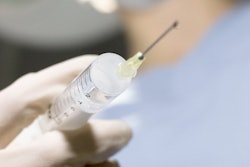
People with periodontal disease are at increased risk of hospitalization due to a heart attack. But those with active periodontal treatment are more likely to adhere to postacute care visits, according to a study published April 20 in the Journal of the American Dental Association.
Researchers evaluated how heart attack-related hospitalizations and aftercare visits varied based on patients' past dental and medical care use. Patients with active periodontal care before their heart attack had more evaluation and management visits after their hospital stay, suggesting a benefit to incorporating oral health to improve outcomes.
"Dental management may have protective effects in relation to hospitalization for [heart attacks] within certain patient groups," wrote the authors, led by Dr. Romesh P. Nalliah, MHCM, an associate dean for patient services at the University of Michigan School of Dentistry in Ann Arbor (JADA, April 19, 2022).
Every year, 800,0000 heart attacks, also known as an acute myocardial infarction, or AMI, occur in the U.S. Prior research suggests patients with periodontal disease are at an increased risk of heart attack-related hospitalizations and that preventive oral healthcare may help protect against hospitalization for some patients.
To study the link between periodontal care and heart attack-related hospitalizations and aftercare, the researchers used insurance claims data from MarketScan Research Databases, which includes information from more than 265 million privately insured patients.
They included patients hospitalized in 2017 for a heart attack who also had claims data in 2016 and in 2018. The researchers then sorted the patients into four groups based on Code on Dental Procedures and Nomenclature (CDT) claims codes before hospitalization:
- Controlled periodontal care - Received periodontal maintenance (CDT D4910)
- Active periodontal care - Received periodontal scaling and root planing (CDT D4341, D4342, D4346, or D4355)
- Regular care - Received dental prophylaxis and checkup (CDT D0120 or D1110)
- No care - No oral healthcare claims codes before hospitalization
Patients were excluded if they were hospitalized for a heart attack in 2016. The authors also excluded patients who did not have medical and dental coverage during all three study years.
Of the 2,370 patients in the study, 47% received regular oral healthcare before their hospitalization, 7% received active periodontal care, and 10% received controlled periodontal care. More than one-third of patients did not have oral healthcare before being hospitalized for a heart attack.
Those in the controlled periodontal care group had more postacute care visits in the 30 days after heart attack hospitalization. They also had shorter hospital stays than patients in the no dental care group (4.39 days versus 5.11 days). Longer hospital stays have been tied to worse outcomes and higher costs, the authors noted.
When the researchers combined the controlled and active periodontal care groups into one group, those who received periodontal care before a heart attack were still more likely to have postacute care visits than those in the no dental care group.
"Results from our cohort study suggest fundamental health differences between the periodontal care group and the other groups," the authors wrote.
The researchers took the increased number of posthospital visits for patients with periodontal disease as a good sign, noting that they were better at following up on care after hospitalization. They pointed to guidance from one health agency that uses postacute care visits as a quality measure to improve patient outcomes and experiences.
The study, however, was not without its limitations. For starters, the MarketScan database does not have data from all states, nor does it include all private insurance markets. Information on deaths was also not available.
Even with the limitations, the researchers say their findings point in one direction: that periodontal care is tied to more favorable outcomes related to heart attack hospitalizations.
"We presented some important implications for clinical care delivery," the authors wrote. "More partnership between dentists and primary care physicians and cardiologists and better sharing of care information among providers could aid in early intervention and prevention of AMI and its complications."



















